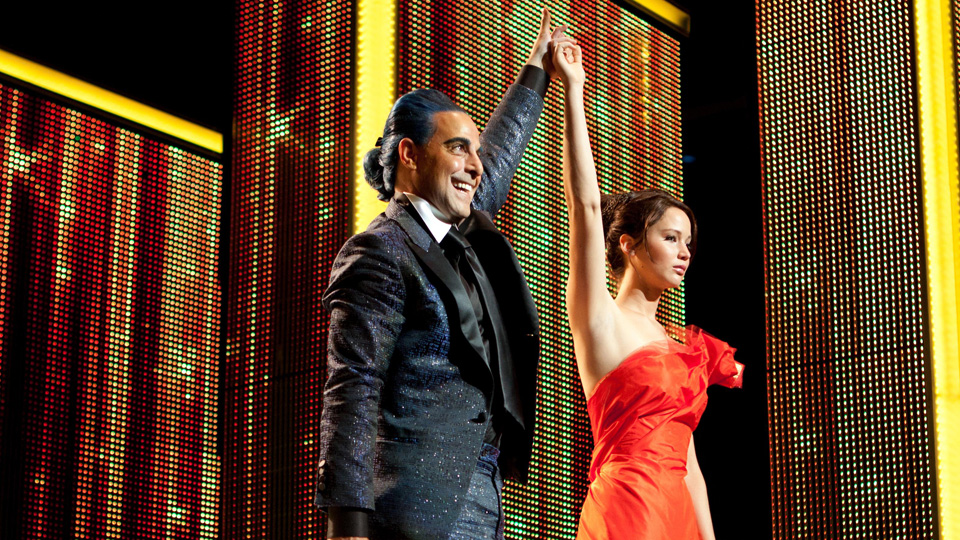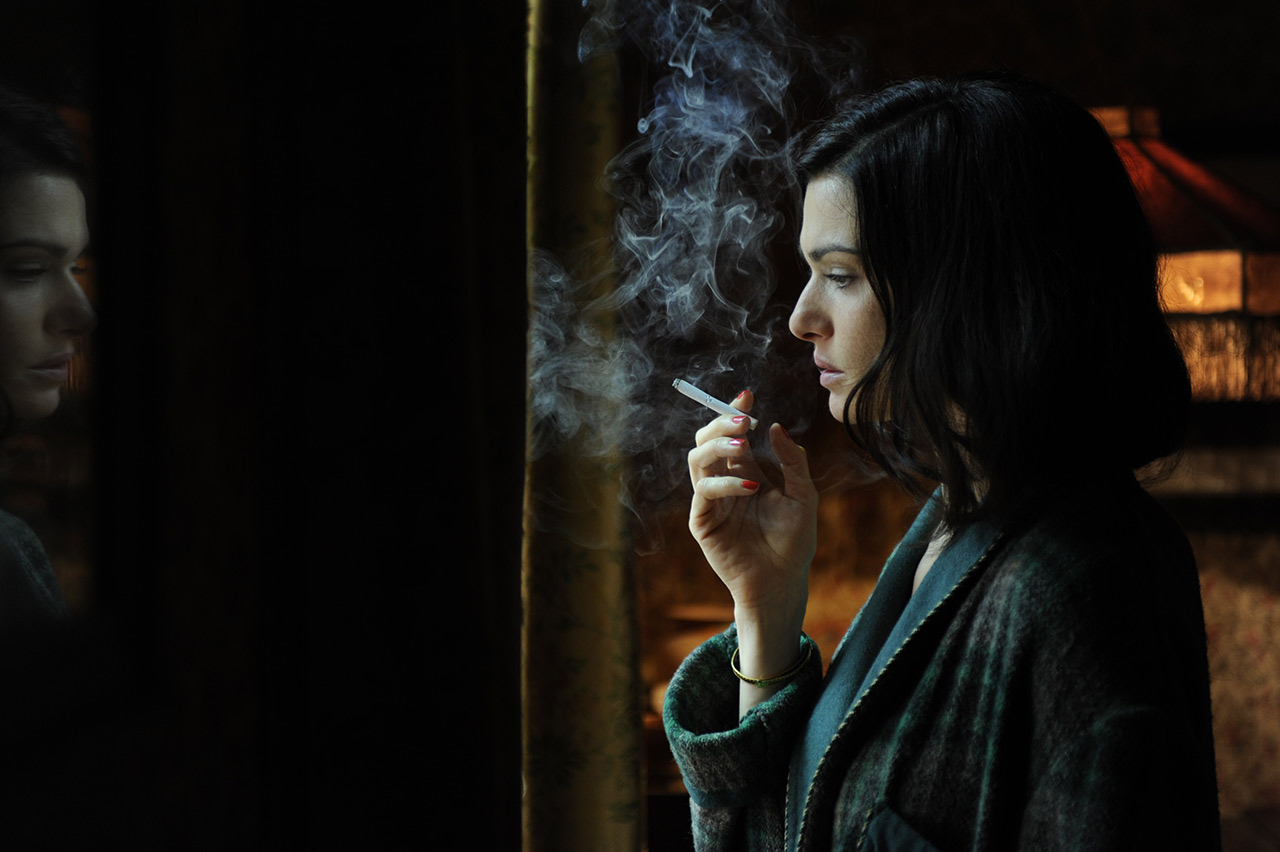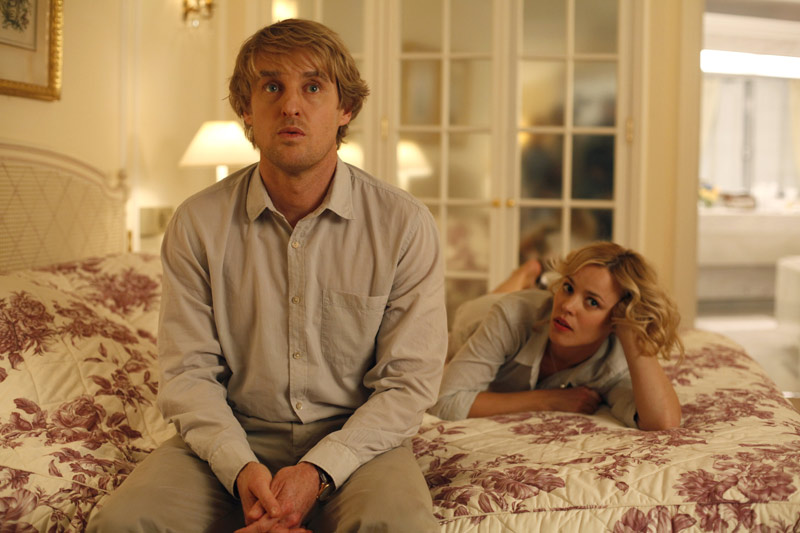The Hunger Games
The Hunger Games is one of the most commercially savvy literary franchises in history. Novelist Suzanne Collins hijacked the bonkers concept of the Japanese novel and film Battle Royale, in which a group of schoolchildren are rounded up and set at each other’s throats in a televised reality game, and yoked it to the story of a strong-willed, hardscrabble heroine whose lifelong experience struggling against poverty gives her an edge against more privileged opponents.
Get The Hunger Games on Blu-ray pr DVD from Amazon.comThe story’s setting is a dystopian-sci-fi vision of the United States where race and class are shamelessly codified through the division of the country into a dozen different districts that exist on a swiftly sliding scale from conspicuous opulence to general destitution. Sound like somewhat stronger stuff than your typical YA sensation? Well, Collins somehow manages to shoehorn a love triangle into this otherwise hardcore yarn, which has the effect of softening the proceedings considerably despite Collins’ ironic utilization of the trope. I powered through the book in, essentially, a single sitting, and it brought me up short when, at almost exactly the book’s two-thirds mark, Collins betrayed her own premise, allowing the story to meander through a long, does-he-love-me detour. But more on that in a bit.
The protagonist of The Hunger Games is Katniss Everdeen. (In print, it’s just a weird name that refers to an edible potato-like plant. When people say it on screen, you can’t help but hear it as “cat-ness,” a clunky allusion to the girl’s skill as a huntress.) She’s played on film by Jennifer Lawrence, which seems like a casting coup until you realize that director Gary Ross, whose previous credits include Pleasantville and Seabiscuit, has no clue how to direct an action movie that will make her struggle feel real. The Hunger Games is significantly less vivid on screen than it is on the page, and the result is that while Lawrence exudes confidence and composure on screen, she never conveys the sense of determination and righteousness — call it moral outrage — that her character demonstrates in the book. Part of that is the loss of the novel’s terse, first-person prose style. Collins kept us in Katniss’ head for the entirety of the story, and that clear view of her thought processes made her mental resourcefulness and courage abundantly clear. And part of it is a loss of nerve when it comes to depicting the brutal violence that must accompany anybody’s death struggle.
The PG-13 rating was obviously a given, but The Hunger Games, despite its appalling premise, hardly pushes at the envelope of that audience-friendly classification, a shortcoming that registers almost as a moral failing. Battle Royale was full of teenage drama, but director Kinji Fukasaku shot it as a straightforward war movie, with all the horror and cruelty that war suggests, making it a spiky metaphor for school days. The violence in The Hunger Games is shot shaky-cam style, and though ace film editor Stephen Mirrione (credited alongside Juliette Welfling) is helming the Avid, the narrative beats involving violence are blurry and incoherent. A sequence where Katniss suffers Videodrome-style hallucinations after being stung by mutant wasps has been totally Nerfed. The strategy is deliberate. This is a movie that hides your eyes during the scary parts.
Ross also has trouble finding a tone for the film, which veers from the burned out coal-mining community where Katniss lives — in many ways a ringer for Lawrence’s Ozark surroundings in Winter’s Bone — to the gleaming, opulent mountain capital of the nation and finally to the games themselves. The production resembels a ha’penny version of Terry Gilliam’s Brazil, replete with gaudy aristocrats (Elizabeth Banks’ painted lady, officiating the games in District 12) and grotesque bureaucrats (Donald Sutherland’s President Snow), many of them with outrageous fashion sense. Once the film lands in the wooded area where the game takes place, it briefly finds its footing and threatens to roar to frightening life.
But the book maintained tension, even during the slow parts, by keeping us in Katniss’ shoes as she tried to work out where she stood in the game, how the viewing audience would be reacting to her decisions, and how that reaction might affect her odds of actually surviving the contest . The film cross-cuts between the tournament arena and the behind-the-scenes machinations in a staging room where unseen puppetmasters control every aspect of the environment, Truman Show style, whether it means conjuring fallen trees at a moment’s notice to send a runaway contender careering back into the danger zone or lobbing a salvo of fireballs in her general direction. It’s understandable, because the film needs something else going on to balance the loss of its internal monologue. But the omniscient point of view, with its labored allusions to contemporary reality TV, turns this lean, mean adventure story toward ordinariness.
I don’t meant to suggest Ross has ruined The Hunger Games. It’s to his credit that the film never turns into just another CG-driven sci-fi crapfest. Further, Collins is a credited screenwriter on the film, so I assume that the story changes were made with her blessing, if not explicitly by her own hands. But fundamental problems with the story are amplified, and made more problematic, in their adaptation to the screen. And one of those is that damned love triangle.
SPOILER TERRITORY:
In both book and film form, The Hunger Games abruptly sells out Katniss as a feminist icon by giving her boy problems to worry about. She has a handsome hunting partner, Gale, back home, who obviously carries a torch for her (whether she realizes it or not). But the handsome baker’s son, Peeta, who accompanies her to the Games as the second contestant out of District 12, declares his own love for Katniss as the pageantry surrounding the impending games, which turns the contestants into short-lived celebrities, kicks into high gear.
Readers obviously know better, but I give Collins points for at least attempting to undermine the romantic subplot’s significance, explaining that Katniss sees the kissy-kissy in large part as a convenient way to sell their story to the unsophisticated and easily manipulated masses who are watching. On film, the expedience of the love story — an obvious sop to the teen and tween audience that nearly filled my large suburban multiplex auditorium at 10 a.m. on a Sunday morning — feels even more blatantly meta. This shit satirizes itself.
The romance is so important to Collins’ vision that she even sells out her readers to keep it alive. The book’s premise promises the unthinkable — if Katniss is to survive The Hunger Games, she’ll have to become a cold-blooded killer, turning against her own love interest to preserve her life. And then Collins goes and makes her the luckiest girl in all of Panem, not just engineering the story so that Katniss only draws blood in self-defense — when she’s trapped like a kitten up a tree, or when someone’s coming directly at her with spear raised for the kill — but literally changing the rules of the game to make it possible for Katniss and Peeta to have a happy ending together.
When she later has the rules change, again, ostensibly to place Katniss and Peeta back in peril of perishing at each other’s hands, it just doesn’t take. Oh, sure, the the slowest and most gullible kids in the reading and viewing audience may suck in their breath, believing the lives of either Katniss or Peeta really are at stake so late in the story. The rest of us realize that Collins’ contract with Scholastic was a three-book deal, and nobody in the whole of Penam is good enough with bow, sword, or spear to take out these star-crossed lovers.
But I don’t begrudge The Hunger Games its massive popularity. While I smile inwardly every time someone points out that Battle Royale did it first and did it best, the truth is that when it comes to humans hunting humans, everything is a remix, dating back at least to The Most Dangerous Game (1932, adapting a short story from 1924). And, stupid name or no, Katniss Eberdeen is a way more useful role model for young girls than that overgrown, self-abnegating infant Bella Swan. I find her relative lack of agency disappointing. But inasmuch as she balances the shallow, sexist caricatures who run unfettered through standard Hollywood fare, especially the romantic comedies — those damned romantic comedies — I’d say she’s doing God’s work and I wish her well.
Posted by on March 26, 2024 10:36 PMGet The Hunger Games on Blu-ray pr DVD from Amazon.com



